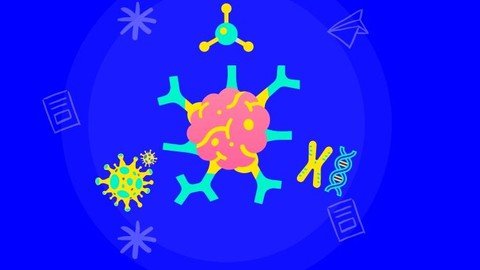
Last updated 6/2022
MP4 | Video: h264, 1280x720 | Audio: AAC, 44.1 KHz
Language: English | Size: 978.04 MB | Duration: 1h 34m
Anecdotes in cancer biology revealing experimental strategies that revolutionized the field of oncology
What you'll learn
Different theories about cancer namely- chemical, chromosomal and viral, formed pieces of a puzzle that led to the birth of Oncogenes and Tumor suppressors
Explore how tumor viruses revealed a bigger picture of cancer and also how identification of some of the viruses contributed to rDNA technology
How cloning strategies accelerated the understanding of molecular dimension of carcinogenesis
Learn about the non-viral mechanism of tumorigenesis and the different mechanism of mutations occurring in cancer cells
Requirements
Students must be familiar with recombinant DNA tools and techniques and concepts of cloning
Students must know basic concepts and terms in molecular biology such as DNA, mRNA, chromosomes, mitosis, meiosis etc.
Description
This course on cancer biology focuses on historical theories and cloning strategies put forth to comprehend carcinogenesis. The objective is to travel back in time to the period when all the pieces of puzzle such as chemical carcinogens, retroviruses and chromosomal mutations came together to reveal the grand scheme of cancer and propose the underlying criteria for cancer development. The highlights of this lecture series are the experimental methods developed during 1960s to 1990s which built the foundation for the current model of cancer which stems from two concepts namely- oncogenes and tumor suppressor genes.You'll learn about Ames test, pro-viral theory, the discovery of reverse transcriptase, Leukemogenesis theory, different mechanisms of tumor cell mutations occurring in the cells, knudson hypothesis and much more.You'll learn-Chemical theory section explains the formation of cancer. Somatic mutation hypothesis and Ames test are concepts covered under chemical theoryChromosomal theory section covers the experiments done to show that chromosomal aberrations cause cancer.Viral theory section deals with Rous sarcoma virus, pro-viral theory, the discovery of reverse transcriptase, Leukemogenesis theory.The experiments that indicated the presence of proto-oncogenes and different mechanisms of mutations occurring in cancer cells.If oncogenes are like accelerators in the car, then tumor suppressors are like brakes. Learn about the cell fusion experiment, Knudson hypothesis and loss of heterozygosity.How p53 (the guardian of the genome) and pRb tumor suppressors were discovered.As is with any course, this course is also backed by Udemy's 30 day money back guarantee.If you're not happy for any reason you will get a full refund.So take this course today, and get deeper insights in cancer biology.
Overview
Section 1: Introduction
Lecture 1 Introduction
Section 2: Chemical theory
Lecture 2 Somatic mutation hypothesis
Lecture 3 Ames test
Section 3: Chromosomal theory
Lecture 4 Experiments to identify chromosomal aberrations
Lecture 5 Experiments identifying DNA, mRNA and protein
Section 4: Viral theory
Lecture 6 Peyton Rous- RSV and Viral theory
Section 5: Tumor viruses and their role in Cancer research
Lecture 7 RSV infection: fate of cells and influence on tumor formation
Lecture 8 Proviral theory
Lecture 9 Reverse transcriptase and Integrase
Lecture 10 RSV experiments- Quiz
Section 6: Hunt for proto-oncogenes
Lecture 11 Varmus and Bishop experiment
Lecture 12 Src Kinase and search for other oncogenes
Lecture 13 leukemogenesis theory
Lecture 14 Hunt for proto-oncogenes - quiz
Section 7: Non-viral mehanism of tumorigenesis
Lecture 15 DNA transfection experiment
Lecture 16 Are viral and non-viral mechanisms different?
Lecture 17 Different mechanism of mutations for oncogenes
Lecture 18 Non-viral mehanism of tumorigenesis- Quiz
Section 8: Discovery of tumor suppressor genes
Lecture 19 Cell fusion experiment
Lecture 20 Knudson hypothesis
Lecture 21 Loss of heterozygosity
Lecture 22 Identification of pRB gene
Lecture 23 Identification of p53 gene
Lecture 24 Tumor suppressors
Section 9: Wrap Up
Lecture 25 Conclusion
Lecture 26 BONUS
High school students, college freshers and research students who are inquisitive enough to dig deeper into the powerful observations, brilliant experimental strategies and different theories about cancer that shaped the field of cancer biology we know today,This course is not for absolute beginners who are looking for a typical in-depth college curriculum and not for experts in the field who are looking for advanced knowledge.,This course would aid research students in tapping into the collective historical wisdom of the pioneers and use them as a guide in further advancing this field.
Homepage
https://www.udemy.com/course/anecdotes-in-cancer-biology/
https://rapidgator.net/file/30ee31a684bd1c9199515c59f37534b2/yhnet.Recombinant.Dna.Technology.A.Game.Changer.In.Cancer.Biology.rar.html

https://uploadgig.com/file/download/882243950931d202/yhnet.Recombinant.Dna.Technology.A.Game.Changer.In.Cancer.Biology.rar

https://nitroflare.com/view/090510D98B816C3/yhnet.Recombinant.Dna.Technology.A.Game.Changer.In.Cancer.Biology.rar
